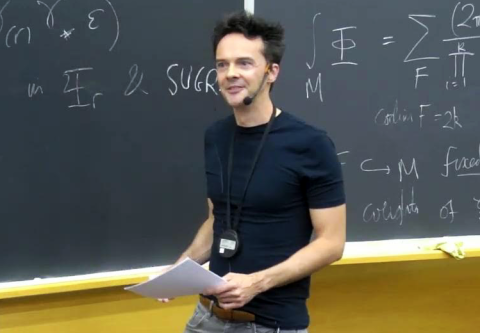A message from James
 I am writing this update somewhere over the Atlantic - after a very busy year, I managed to sneak away a little before the end of term to attend a theoretical physics conference in Sao Paulo, Brazil (pictured).
I am writing this update somewhere over the Atlantic - after a very busy year, I managed to sneak away a little before the end of term to attend a theoretical physics conference in Sao Paulo, Brazil (pictured).
As I left the Andrew Wiles building earlier today I saw some of our Academic Administration team bringing bundles of scripts back from Examination Schools to begin the arduous process of script checking prior to the all-important marking. I also bumped into a faculty member, who had managed to get one third of the way through his pile yesterday. But mostly I've been thinking about our undergraduates, some of whom haven't even started their end of year exams yet. It's such an important and challenging time for them: some are getting a measure of their progress so far, while others are about to leave us and become alumni, though we also hope many of them will progress to a career in mathematics. We wish them all well.
Students, and more specifically teaching, have been at the forefront of my mind as I complete my first year as Head of Department, also for other reasons. As some of you will have heard, last month we tragically lost one of our greatest advocates for excellence in teaching, when Vicky Neale died at the age of 39 after a long illness. Vicky was an exceptional person, and we feel her loss each day. Her natural talent and unbounded enthusiasm for teaching and communicating mathematics, her dedication and devotion to her students (especially at Balliol College), how she revised her lecture notes every year and worried about how we should adapt during the pandemic (she was our Faculty Teaching Advisor), her conviction to speak out and say what she thought was right: she was a role model for all of us. It is not only us who feel the loss. The tributes on our website, across social media and on BBC Radio 4 programmes such as "the Last Word" and "More or Less" say it all.
In the coming year we shall push on with improving our teaching and assessment, work with which Vicky was closely involved. While some students cope well with our current system, others do not. Introducing more varied forms of assessment will hopefully allow more students to reach their potential and better demonstrate their mathematical ability, as well as being more inclusive for students with disabilities. For example, independent project work reflects more closely what mathematicians actually do, and would help develop valuable skills. Across the University other methods of assessment are already in use, including in some of our current Masters courses, and we hope to work with the University’s Centre for Teaching and Learning next year to develop these ideas further. It's something that will take time to get right and implement, but we have a team that is committed to it.
As well as teaching, Vicky's other passion was conveying the joys and value of mathematics, especially to those still at school and who are perhaps undecided about their academic futures. That passion is ours too, as we continue to prioritise increasing access for students, whatever their background, and in particular for female students who still make up less than a third of our undergraduate student body. Moreover, we are not only determined to make our undergraduate intake more representative, but also to redress the gender imbalance at postgraduate level. The loss of talented mathematicians after undergraduate study is a barrier to progress across mathematics as a whole, not just in Oxford.
With this in mind we are very pleased to announce our first Maryam Mirzakhani scholar, a scheme funded by XTX Markets. The scheme has endowed a fully-funded postgraduate research scholarship for a female mathematician and our first scholar (Marta Bucca) starts in my own research group, Mathematical Physics, in October. This scheme joins two other schemes: the Martingale Postgraduate Foundation Programme, which provides scholarships in mathematics for students at five universities for whom financial circumstances are a barrier; and the Jane Street Graduate Scholarships which provide for UK black and mixed black students wanting to pursue a postgraduate taught programme. If you would like to get involved in supporting postgraduate study in Oxford Mathematics, do please get in touch.
Finally I would like to finish with an invite, or at least a "save the date". It is 30 years since Andrew Wiles first made public the work that made him famous with a seminar at the Isaac Newton Institute in Cambridge. But it is also ten years since we opened the building in Oxford that bears his name, and where he is still an active member of our department. So on the weekend of 23 September 2023 we shall we celebrating our birthday. You are all most welcome - details to follow!
In the meantime, I wish you all a very happy summer.
Best wishes,
James

